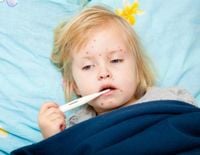Measles outbreaks across the United States and Canada are raising alarm as cases surge to levels not seen in years. In the U.S., the Centers for Disease Control and Prevention (CDC) reported over 378 confirmed cases of measles in 2025 alone, surpassing the total number for all of 2024 and marking a significant public health concern. The outbreaks are primarily concentrated in West Texas, New Mexico, and Kansas, with Texas reporting a staggering 327 cases across 15 counties as of March 25, 2025.
Dr. William Moss, an epidemiology professor at the Johns Hopkins Bloomberg School of Public Health, likened the spread of measles to a forest fire, stating, "What is interesting about this current outbreak is the speed at which it’s expanding and increasing. If those sparks land in a community with low vaccine coverage, we’re going to see a larger measles outbreak." This analogy underscores the critical role of vaccination in controlling the disease's spread.
In Texas, the outbreak has led to 40 hospitalizations and two deaths among unvaccinated individuals, including a school-age child who died last month and an adult in New Mexico who succumbed to measles-related complications. The rapid rise in cases has prompted some parents to seek early vaccinations for their children, with pediatricians noting a significant increase in requests for the measles, mumps, and rubella (MMR) vaccine.
Dr. Ana Montanez, a pediatrician in Lubbock, Texas, reported that her clinic has nearly doubled its vaccine administration in recent months. She explained, "In the case of an outbreak or international travel, children as young as 6 months can receive a dose of the vaccine, and those under 4 who have had one dose can receive their second earlier, separated by at least four weeks." This flexibility in vaccination schedules reflects the urgent need to protect vulnerable populations amidst rising case numbers.
Meanwhile, in Canada, the situation is similarly dire, with the country experiencing its largest measles outbreak in over a decade, surpassing 500 cases. Health experts are advocating for the use of wastewater surveillance as a tool to track the virus's spread. Eric Arts, a microbiology professor at Western University, emphasized the importance of this method, stating, "We could identify the wastewater catchment areas where the measles virus might be spreading and then put in public health measures that would make a huge difference." However, despite its potential, public health officials in Ontario have scaled back wastewater testing, raising concerns about the effectiveness of current monitoring strategies.
In the U.S., the CDC defines an outbreak as three or more related cases, and as of March 25, 2025, three clusters have qualified as outbreaks. The ongoing situation highlights the importance of maintaining high vaccination rates to achieve herd immunity, which protects communities by reducing the likelihood of disease spread. However, childhood vaccination rates have declined since the COVID-19 pandemic, with more parents opting for exemptions based on personal beliefs.
Dr. Anna Durbin, a vaccine researcher at Johns Hopkins, noted that vaccines are often victims of their own success. She explained, "The reason parents aren’t familiar with these diseases is because vaccines have been so effective in controlling them and preventing children from becoming ill and dying." This sentiment is echoed by the alarming statistics revealing that two unvaccinated individuals have died from measles-related causes this year.
The CDC recommends the first MMR shot for children between 12 and 15 months, with a second dose given between ages 4 and 6. However, many children under 1 year remain vulnerable, prompting some parents to seek early vaccinations. Dr. Shilpa Patel, a pediatrician in New Jersey, noted that her practice has begun offering early doses to families concerned about rising measles counts in their neighborhoods.
As the outbreaks continue to unfold, experts stress the need for public health initiatives to address the declining vaccination rates. Dr. Alexis Robert from the London School of Hygiene & Tropical Medicine highlighted that measles is one of the most contagious viruses, capable of infecting 12 to 18 people from a single infected individual. He stated, "Measles outbreaks occur when vaccine coverage is low, as it can spread more easily between those who do not have protection." This underscores the urgency of increasing vaccination coverage to prevent further outbreaks.
Globally, measles remains a significant health threat, with an estimated 107,500 deaths attributed to the disease in 2023, primarily among unvaccinated children under 5. In England, there were 2,911 confirmed cases in 2024, the highest number since 2012, with only 85% of the population receiving the recommended two doses of the MMR vaccine, well below the 95% target set by the World Health Organization.
The ongoing outbreaks serve as a stark reminder of the importance of vaccination in preventing infectious diseases. Experts warn that even a small decline in vaccine uptake can lead to devastating consequences, as seen in the current situation. The rise in measles cases across both the U.S. and Canada highlights the need for renewed efforts to educate the public about the importance of vaccination and the risks associated with measles.
In conclusion, as measles outbreaks continue to spread across North America, public health officials and experts are calling for increased vaccination efforts and the implementation of innovative strategies like wastewater surveillance to monitor and control the virus. The fight against measles is far from over, and the importance of vaccination cannot be overstated.








